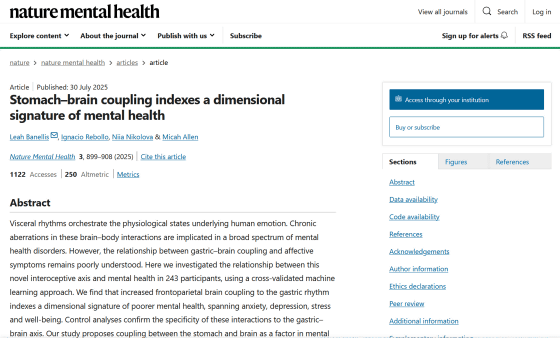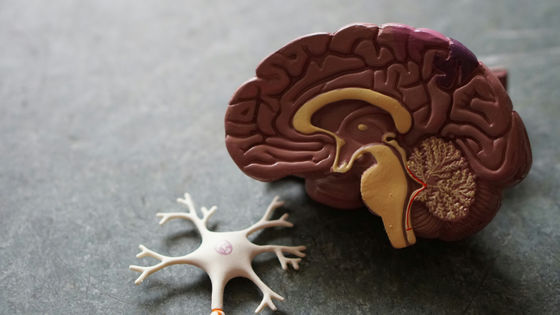Research results show that 'hidden electrical signal synchronization' between the stomach and brain affects mental health

The human intestine contains over 100 million nerve cells, and is sometimes called the 'second brain' due to its function and influence on the brain. However, little research has been done on the relationship between the stomach, which is connected to the intestine, and the brain. A new study has shown that people who have synchronized electrical signals between their stomach and brain are more likely to have mental health problems.
Stomach–brain coupling indexes a dimensional signature of mental health | Nature Mental Health

The 'stomach's brain' is more in sync with the mind during mental distress
https://health.au.dk/en/display/artikel/the-stomachs-brain-is-more-in-sync-with-the-mind-during-mental-distress
Hidden Rhythms Between Your Stomach And Brain Could Shape Your Mood : ScienceAlert
https://www.sciencealert.com/hidden-rhythms-between-your-stomach-and-brain-could-shape-your-mood
Although the stomach is directly connected to the brain via the vagus nerve, most research on mental health and the digestive tract has focused on the lower digestive tract, such as the small intestine and large intestine, and very little on the upper digestive tract, including the esophagus and stomach.
'The stomach has been largely ignored; most research has focused on gut bacteria and the lower gastrointestinal system,' said lead author Leah Vannelis , a neuroscientist at Aarhus University in Denmark.

A research team from Aarhus University and
The stomach has its own nervous system, generating waves of electrical signals approximately every 20 seconds, even when not eating, with a constant rhythm similar to the heartbeat. Statistical analysis of the data revealed that people whose brainwave and stomach electrical signal patterns were more synchronized were at higher risk of mental problems such as anxiety, depression, and stress. Meanwhile, people whose patterns were less synchronized were reported to have better mental health and happiness.
'Our findings suggest that gastric rhythms are also deeply connected to emotional well-being,' said Vannelis. 'In people under psychological stress, the connection between the stomach and the brain may actually be too strong.'
'Intuitively, we think that stronger communication between the body and brain is a sign of good health,' said co-author Micah Allen , professor of clinical medicine at Aarhus University. 'But here, unusually strong gut-brain connections seem to be associated with increased psychological stress, possibly because the system is under strain.'

This study only shows a link between stomach and brain electrical signals, not a causal relationship, so more research is needed to determine whether stomach activity directly causes psychiatric disorders, or vice versa.
Still, the researchers believe that the patterns of stomach and brain electrical signals are objective and measurable, which could lead to the development of physiological indicators of mental health based on bodily rhythms. Furthermore, regulating stomach electrical signals may one day be able to treat or alleviate the symptoms of psychiatric disorders.
'We know that certain medications and foods can affect stomach rhythms,' Allen said. 'In the future, this research may help us customize treatment based on the body-brain interaction, not just what patients are feeling.'
Related Posts:
in Science, Free Member, Posted by log1h_ik







